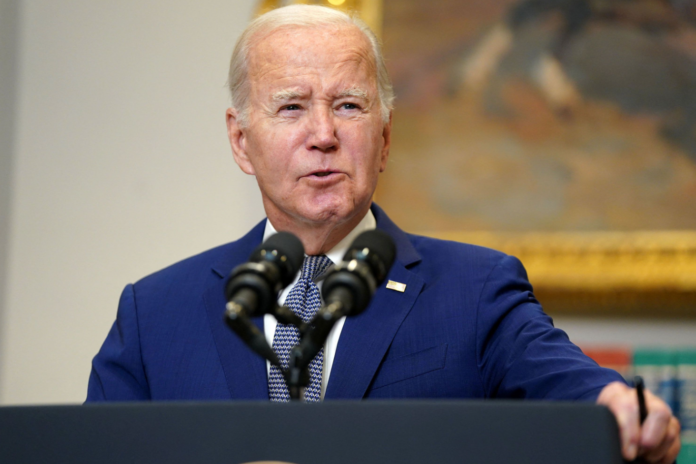As President Joe Biden steered clear of a crucial topic during his State of the Union address, his administration’s silent push for an extensive upgrade of America’s nuclear arsenal has sparked intense criticism. The commitment to refurbish all three legs of the nuclear weapons triad—ICBMs, submarines, and bomber aircraft—comes with a staggering price tag over $2 trillion over the next two decades, raising alarm bells among those who advocate for peace and environmental sustainability.
Biden’s omission of this massive expenditure from his speech is telling, especially considering his emphasis on addressing the deficit and his critique of the Trump administration’s tax cuts. However, the elephant in the room—an $886 billion military spending that swallows more than half of the U.S. government’s discretionary budget—remained unaddressed. This bloated military budget includes the controversial nuclear weapons upgrade, with the replacement of 480 land-based missiles by the new “Sentinel” missiles alone forecasted to exceed $756 billion over the next decade.
This vast expenditure on new weapons systems not only heightens the risk of nuclear conflict—a scenario with potentially catastrophic consequences—but also diverts crucial funding from essential public services such as housing, healthcare, education, and addressing the climate emergency. The irony is palpable as the Biden administration simultaneously commits to climate action yet pours trillions into the very technologies that epitomize the apogee of environmental destruction.
The administration’s approach to nuclear weapons seems to echo a broader, unsettling trend: a reluctance to fully embrace the disarmament and non-proliferation ethos many hoped would guide U.S. policy. Instead of championing treaties and international agreements that aim to reduce the nuclear threat, Biden’s silence on the matter suggests a tacit endorsement of a dangerous status quo, influenced by a powerful military-industrial complex.
Critics argue that the justification for these new nuclear projects is thin at best. The land-based ICBMs, for example, are strategically obsolete, their fixed locations making them easy targets in the event of a conflict. Their retirement would not only enhance U.S. national security but also redirect billions in taxpayer dollars to more constructive purposes. Yet, the combined clout of the ICBM caucus, the Air Force, Northrop Grumman, and other contractors—buoyed by extensive lobbying efforts—keeps this project on track.
The claim that reducing the nuclear arsenal would undermine U.S. deterrence is a red herring; the remaining forces would still possess overwhelming destructive capability. The U.S. arsenal, by conservative estimates, comprises thousands of warheads, each with the potential to annihilate entire cities. The morality and logic of maintaining, let alone expanding, this arsenal in a world grappling with existential threats like climate change and global inequality are increasingly indefensible.
Biden’s administration, by keeping its nuclear modernization plans under wraps, has opted for a strategy of obfuscation rather than open debate. This choice not only sidelines public discourse on a matter of global significance but also perpetuates a fiscal charade that funnels vast sums into an industry predicated on the ultimate means of destruction. The silence on this issue speaks volumes, revealing a disconcerting alignment of priorities that privileges militarism over the urgent needs of people and planet.
In the face of these developments, the call for transparency, accountability, and a reevaluation of national security in the age of climate crisis has never been more pressing. As Biden’s nuclear funding quietly undermines global stability, the imperative to challenge this course of action and advocate for a world free of nuclear threats is a battle for the very soul of our planet.



